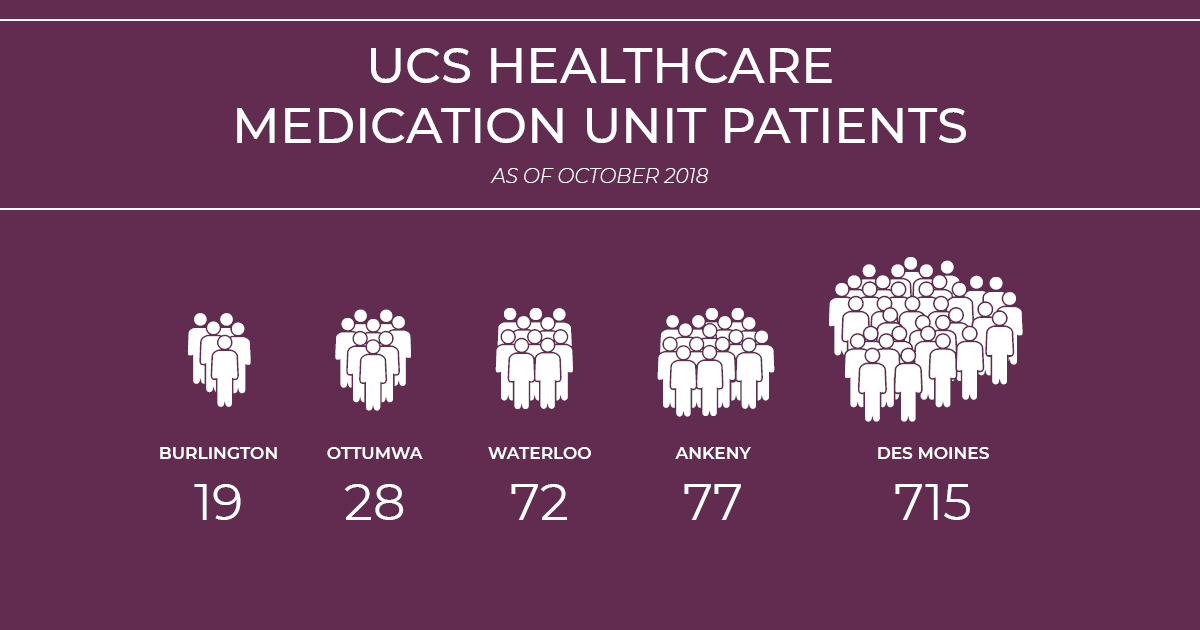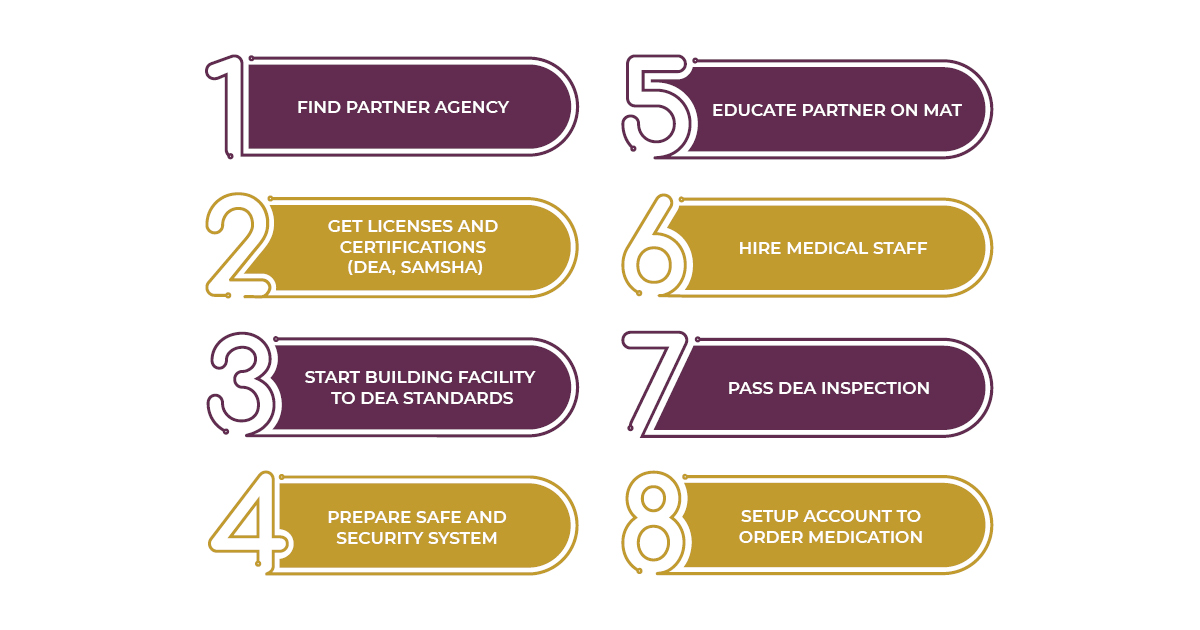How Medication Assisted Treatment Can Lead to a Life of Recovery
January 29, 2019
Over the past several years, opioid use disorder has been on the rise across the nation and in Iowa with frequent headlines appearing in the media about overdoses and increases in the usage of prescription painkillers and heroin. Now, UCS Healthcare is taking steps to help patients live a productive life in recovery, thanks to medication units which administer safe, monitored doses of Methadone or Suboxone to alleviate opioid withdrawal symptoms when used as directed in a patient’s therapeutic plan.
The Options for Opioid Dependent Adults in Iowa
UCS Healthcare currently operates six medication units and three opioid treatment providers (OTP) across the state of Iowa, with another five expected to open up soon. Previously, the only UCS clinic for medication assisted treatment (MAT) was in West Des Moines. When a patient starts MAT, it relieves withdrawal symptoms for 24 to 36 hours, requiring patients to come in daily for their dosage. For many individuals, driving an hour or more every day was not an option, so UCS wanted to reduce those transportation barriers by opening medication units.
Despite misconceptions that opioid use disorder is not a problem in some rural Iowa communities, UCS Healthcare medication units added in Ottumwa, Burlington, Waterloo, Knoxville, Carroll and Fort Dodge are already helping nearly 200 patients lead more productive lives while in recovery. UCS Healthcare’s West Des Moines location serves more than 700 patients in MAT, and we now have certified opioid treatment provider clinics at our Ankeny and Knoxville locations. For many individuals struggling with opioid use disorder, MAT is the first chance to work towards a life of recovery.

UCS Healthcare has seen time and time again that medication assisted treatment works because it allows most patients to avoid getting sick, giving them the time and energy to work on rebuilding their lives instead of fighting withdrawal symptoms. According to Dave Chapin, medication unit treatment director at UCS Healthcare, medication units can be essential in the recovery of individuals with severe opioid dependency. Chapin says, “The majority of our patients, as they’re involved in MAT services, start putting the pieces of their lives back together. They’re reunifying with family, they’re working, going to school, they’re becoming part of a productive society.”
In addition to patients struggling with severe opioid use disorder, UCS Healthcare also sees patients who may recognize they are headed down the wrong path, and want to stop their opioid use before their life completely derails.
For patients with this type of background, the opioid use frequently begins with an injury. The pain medication prescribed may become an addiction for the patient. Once their doctor will no longer prescribe the opioid, the patient may become desperate enough to purchase opioids or heroin illegally. Patients realize they may get into criminal activity, lose their families and their jobs, so they seek help proactively through UCS.
The Process of Embedding Medication Units Across the State
When UCS recognized the need for medication assisted treatment (MAT) in Iowa, its team of medical professionals set out to understand the process to set up a medication unit. They found that the Drug Enforcement Administration (DEA) and other federal and state agencies have very strict requirements for what it takes to become a medication unit. In addition, UCS Healthcare is the first in Iowa to open medication units and one of the first in the United States. At every stage, from construction of the UCS medication unit to day-to-day operations, there were hurdles that UCS Healthcare needed to overcome to be licensed. UCS was the first to face these, as there wasn’t an example of another medication unit in Iowa yet to follow.
The official definition of SAMSHA (Substance Abuse and Mental Health Services Administration, a branch of the U.S. Department of Health and Human Services) for a medication unit is “a facility established as part of, but geographically separate from, an opioid treatment program from which licensed private practitioners or community pharmacists dispense or administer an opioid agonist treatment medication or collect samples for drug testing or analysis.” To set up a medication unit, the first step was to build relationships with existing behavioral health agencies in Iowa, so UCS Healthcare set out to find partners statewide.
According to Chapin, one of the biggest barriers to forming these partnerships was the misconception from city officials, the medical community and others, that there wasn’t a need within their community. Officials had this perception because they did not have patients seeking therapy for opioid use disorder. What many organizations don’t realize is that the lack of patients seeking treatment actually points to a need for a medication unit. Often, patients struggling with opioid use disorder will not seek treatment because the withdrawal symptoms from opioid use are so severe.
After helping the organizations understand that there was a need, the next concern UCS heard expressed was about monitoring medication assisted treatment. Many assumed that medication was prescribed freely. In reality, the medications used in MAT are highly regulated and monitored, literally under lock and key. Patients are seen by a medical provider to determine the appropriate dosage. The patient visits the clinic regularly for a dosage of MAT and to participate in counseling. MAT with counseling is proven to be an effective treatment for opioid use disorder.
UCS and Opioid Treatment Program Partnerships
UCS Healthcare and its partnering agencies focus on integrated care — treating the whole person rather than just the substance use disorder. Before medication units were established, the biggest resources that rural towns in Iowa had to address substance use disorders were prevention and awareness. Now, with embedded medication units, communities will have an effective process of treatment which combines the therapy services of the behavioral health agencies with the prescriptions offered by the medication unit managed by UCS.
Once a new partner agency comes on board, Misty Angrick, medical services director for UCS Healthcare, files for all of the necessary applications including licenses, DEA and SAMHSA certifications.
From there, meetings are held with building contractors to ensure DEA standards are met for the medication unit to be built within the existing partner agency clinic With the construction underway, Angrick will start working on the necessary supplies including a DEA-approved safe, security system, IT needs and staff. Meanwhile, Chapin will begin working closely with the partner organization, training the staff to help them understand how MAT works in conjunction with therapy. Once the UCS medication unit is built and passes all necessary inspections, UCS Healthcare sets up an account to order Methadone and Suboxone. The length of the setup process varies, depending on how quickly all steps can be completed. In an ideal scenario, medication units can be established in four to six months.
Each medication unit is staffed with at least one full-time nurse, one part-time nurse, and one part-time nurse practitioner. There are distinct advantages to joining the UCS Healthcare team.
On top of a competitive benefits package and daytime hours, UCS Healthcare provides a diverse, educational and tight-knit environment. With three full-service locations (therapy and MAT) in West Des Moines, Ankeny and Knoxville, medication unit nurses and nurse providers have ongoing support. In addition, the provider organizations are very approachable and committed to helping the UCS medication assisted treatment nurses to learn all they need to be successful. Above all, medical professionals and therapeutic providers with UCS Healthcare and its partner agencies make a difference in the lives of patients, their families and the communities they serve.
The growth of our services and locations means we are looking for full-time and part-time professionals to join our team. To learn more about the job opportunities, visit the career page.
Because UCS Healthcare prioritizes safety and security, there are specific security protocols that must be followed once the unit is treating patients. All units must meet certain security protocols to prevent theft and diversion.
For both Chapin and Angrick, a medication unit is considered successful as long as they are treating a single patient. Once units are treating about 60 patients, they will become self-sustaining, but UCS is committed to continuing to building these medication units throughout Iowa.

Treating Patients with Opioid Dependency
When a patient is seeking recovery that includes MAT, UCS Healthcare is committed to helping them begin that recovery as quickly as possible. Patients are not required to wait a week or a month until appointments are available. Most will meet with an on-site nurse that same day to determine dependency on opiates, alcohol or other substances. This process usually takes 30-60 minutes. If a patient is diagnosed with a dependency that can be treated, they are eligible for MAT, and will next meet with a medical provider who determines which medicine to prescribe. MAT and counseling treatment both begin immediately.
UCS Locations & Services
West Des Moines
1300 Woodland Avenue
West Des Moines, IA 50265
Ankeny
1555 SE Delaware,
Suite M
Ankeny, IA 50021
Knoxville
813 N. Lincoln Street, Suite #9
Knoxville, IA 50138
Atlantic*
1500 E 10th Street
Atlantic, IA 50022
Burlington*
1340 Mt Pleasant Street
Burlington, IA 52601
Fort Dodge*
1506 31st Ave. N.
Fort Dodge, IA 50501
Carroll*
23751 Highway 30 East
Carroll, IA 51401
Ottumwa*
310 West Main Street
Ottumwa, IA 52501
Waterloo
3362 University Ave Waterloo
Iowa 50701
*Substance use disorder treatment services provided by certified treatment provider partners in these locations.
As of February 2019
ucsonline.org
ucsinformation@ucsdsm.org
515-280-3860